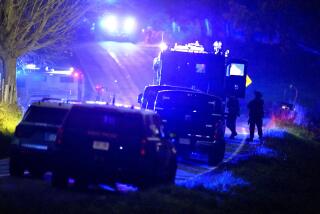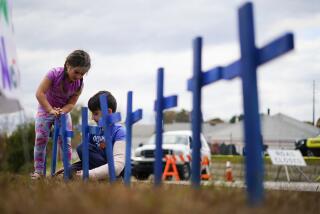America From Abroad : Premier’s Assassins Fighting for Freedom : Rumors abound that Bernard and Phyllis Coard, whose crime sparked Grenada invasion, may be freed early from prison. But public opposition is strong.
- Share via
ST. GEORGE'S, Grenada — Three years after they were spared the hangman’s noose, Bernard and Phyllis Coard languish in a prison fortress atop a hill overlooking the green slopes and sheltered harbors of this Caribbean island.
Former officials of the Grenadian government, the Coards were convicted of murdering Prime Minister Maurice Bishop and his followers in the bloody coup cited as one justification for the U.S. invasion of Grenada in 1983.
Today, the couple are fighting to gain their freedom, an unlikely prospect. The case lingers as a reminder of Grenada’s tumultuous history at a time many on the island want to forget it.
The island is awash with rumors that the government of Prime Minister Nicholas Brathwaite is considering releasing the Coards, a move that does not seem to have much popular support. Bishop still enjoys a sort of cult-hero status among many Grenadians, who blame the Coards’ treachery for derailing Grenada’s revolution.
“Every time I hear mention of (Bernard Coard’s) name, my skin crawls,” said Anthony Phillip, 44, a construction worker who returned to Grenada after the invasion. “If I see him, I would break him in two.
“I loved Maurice Bishop. He had a lot of good things in mind for his people. He tried. Maurice was not a Communist. Coard was a Communist.”
Phillip was one of about 100 people who turned out recently at a political rally for the New National Party, which governed briefly after the invasion. Grenada is scheduled to hold national elections by June, and politicians have already begun to campaign.
If Brathwaite plans to release the Coards, it seems unlikely he will do so before the election, since an unpopular action could hurt his National Democratic Congress party at the polls.
The Coards’ cause is being championed by Ramsey Clark, the former U.S. attorney general, a quixotic champion of political causes. Clark argues that the Coards were set up as scapegoats by the Ronald Reagan Administration, which he says was bent on destroying a pro-Cuban leftist government on Grenada. What better way to justify the invasion than make it appear that the revolution had turned on itself? the American asks.
No one denies that the People’s Revolutionary Government, which came to power in a 1979 coup by overthrowing corrupt and heavy-handed Prime Minister Eric Gairy, was mired in a bitter internal struggle. Hard-liners in the Central Committee, such as Phyllis Coard, who had a reputation as the most fervent of the government’s Marxists, and her husband Bernard, an ideologue who was finance minister, were fighting for greater control over the direction the government was taking.
On Oct. 13, 1983, the hard-liners arrested Bishop and several members of his Cabinet and declared a 24-hour, shoot-to-kill curfew. On Oct. 19, crowds of Bishop supporters managed to free the prime minister, and they all marched to Ft. Rupert, on the edge of the capital city of St. George’s, to challenge the Coard faction.
But Bishop and his group were overpowered. They were lined up against a wall of the fort’s inner patio and shot to death: Bishop; Jacqueline Creft, his pregnant girlfriend and education minister; 14 other officials, and scores of civilian supporters.
Six days later, the U.S. armed forces invaded Grenada. Reagan cited the killings as proof that anarchy had seized the tiny island. The truth is the U.S. government had little use for Bishop either, but his demise lent a pretext to the invasion that would win the applause of many Grenadians.
The Coards were arrested by the American invaders almost immediately and taken to a U.S. warship in the Caribbean.
Four months later, the U.S.-installed government filed murder charges against the Coards and 17 others. Charges against one defendant were dropped when he agreed to turn state’s evidence, and after numerous motions and delays the trial of 18 people got under way in April, 1986.
The proceedings were high theater, full of irregularities, and they dragged on interminably. One journalist covering the trial described it as a Mad Hatter’s tea party. The defendants refused to recognize the jurisdiction of the court, complained that they were being mistreated in prison and were frequently removed from the courtroom after breaking into loud chants.
The defense attorneys quit en masse--at the defendants’ request, according to a 1987 report by Amnesty International.
On Dec. 4, 1986, the Coards and 12 others were found guilty of murder and sentenced to hang. Three were found guilty of manslaughter, and one defendant was acquitted.
Then, the multimillion-dollar, multiyear appeal process began, and this time the 14 defendants sentenced to death let their attorneys do their job. For months the defense team argued the law before a three-judge panel, which in July, 1991, upheld the convictions and sentences.
Reports at the time said that five of the defendants, including Bernard Coard, were prepared for execution--shaved, fitted for suits, their graves dug, the gallows built. But finally, Brathwaite commuted the sentences.
A death sentence commuted to a life term is one thing. But freedom for the Coards?
In a letter to Secretary of State Warren Christopher, Clark asked that secret U.S. documents relating to the invasion be declassified.
Clark maintains that the documents might help bolster his contention that Coard and the Central Committee did not order the Bishop assassination.
“As an act of conciliation, these people should be released,” Clark said in a telephone interview. “(The case) hangs over St. George’s . . . like a pall.”
Despite the irregularities and oddities in the trial, U.S. officials in Washington hold up the Coard prosecution as an example of a functioning justice system in post-invasion Grenada, and the possibility of a release does not seem to have much appeal.
“It’s a Grenadian issue, but I don’t think we’d like it,” a U.S. official said. “They (the Coards) are criminals and they had due process.”
More important, quite a few Grenadians have their doubts about releasing the Coards.
Releasing the convicted killers “would be extremely unpopular and their lives would be at risk,” veteran Grenadian writer Alister Hughes said. “Reconciliation--now? So soon? I don’t think so. I don’t think reconciliation would sink in too well now. Too many people lost their folks. . . . People are too bitter still. Maybe their grandchildren can forgive.”
More to Read
Sign up for Essential California
The most important California stories and recommendations in your inbox every morning.
You may occasionally receive promotional content from the Los Angeles Times.











